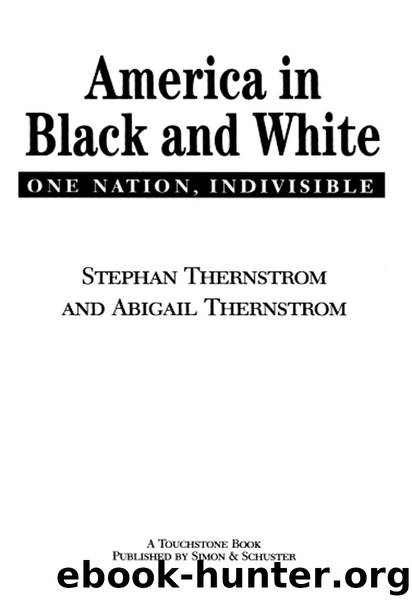America in Black and White: One Nation, Indivisible by Thernstrom Stephan & Thernstrom Abigail

Author:Thernstrom, Stephan & Thernstrom, Abigail [Thernstrom, Stephan]
Language: eng
Format: epub
Publisher: Simon & Schuster
Published: 2009-07-14T00:00:00+00:00
TRACKING
If standardized tests are unfair to blacks—or more broadly to students from other than middle-class homes—it follows that using them to assign students to particular courses or academic tracks is unjust and indefensible. In recent years civil rights activists and educational progressives in general have demanded the elimination of what has been variously called “tracking,” “ability” grouping, or “performance” or “competency” grouping. FairTest maintains that, although children are “different,” none have academic “deficits.”88 The Massachusetts Advocacy Center declares that schools should promote “a sense of community and social justice, not privilege or definitions of “deserving’ and ‘undeserving.’”89
It is impossible to tell how much actual practice in the schools has been changed as a result of such attacks, but criticisms of this sort dominate the professional educational literature. The very process of sorting and grouping students is said to be a self-fulfilling prophecy; students labeled as less competent quickly become so. It is a well-founded concern when long-term judgments about likely academic performance are made on the basis of tests at an early age. It is also legitimate to object to every form of dumbed-down schooling. Almost every student can meet academic standards higher than those generally in place in the United States.
Critics of tracking charge that identifying students as academically deficient has a special impact on black children; minority status (in and of itself) lowers teachers’ expectations, with the result that students learn less.90 That was an argument that Judge Skelly Wright made in the D.C. desegregation case, which was in turn cited approvingly by Judge Peckham in his first Larry P. decision.91 Judge Wright referred to teachers’ “misjudgments” about the ability of black students. Other tracking critics are not so kind. They make the very serious charge that racism—not poor judgment—determines who ends up in what level classes. In a September 1990 newscast an ABC News reporter stated flatly that “throughout the nation schools are sorting students into high-and low-ability groups, often with racial bias regardless of their test scores.” The program went on to quote UCLA’s Jeannie Oakes. “Often you’ll see high-scoring kids in low tracks, low-scoring kids in high tracks and often that relates to ethnicity and social class,” she said.92 It’s a perception that, on occasion, has triggered organized parent protest. This was the case in early 1990 in Selma, Alabama, when parents took to the streets in part over the tracking issue. “We have black children who are high achievers, who have high test scores, who have not been allowed to take algebra,” an attorney and activist with a high school daughter complained.93 A year later, parents in the Richardson, Texas, school district charged that black children were put in special-education classes not only because they spoke, dressed, and acted differently, but also because whites didn’t want any academic competition from blacks.94
No qualified child should be “not allowed” to take algebra; indeed, schools should expect almost all children to take geometry and trigonometry as well. And there is no doubt that in tracked public schools, black (and Hispanic) students cluster disproportionately in the less demanding courses.
Download
This site does not store any files on its server. We only index and link to content provided by other sites. Please contact the content providers to delete copyright contents if any and email us, we'll remove relevant links or contents immediately.
| General | Discrimination & Racism |
Nudge - Improving Decisions about Health, Wealth, and Happiness by Thaler Sunstein(7706)
The Fire Next Time by James Baldwin(5444)
iGen by Jean M. Twenge(5415)
Adulting by Kelly Williams Brown(4574)
The Sports Rules Book by Human Kinetics(4386)
The Hacking of the American Mind by Robert H. Lustig(4382)
The Ethical Slut by Janet W. Hardy(4251)
Captivate by Vanessa Van Edwards(3839)
Mummy Knew by Lisa James(3691)
In a Sunburned Country by Bill Bryson(3542)
The Worm at the Core by Sheldon Solomon(3487)
Ants Among Elephants by Sujatha Gidla(3467)
The 48 laws of power by Robert Greene & Joost Elffers(3291)
Suicide: A Study in Sociology by Emile Durkheim(3022)
The Slow Fix: Solve Problems, Work Smarter, and Live Better In a World Addicted to Speed by Carl Honore(3009)
The Tipping Point by Malcolm Gladwell(2921)
Humans of New York by Brandon Stanton(2873)
Get What's Yours for Medicare: Maximize Your Coverage, Minimize Your Costs by Philip Moeller(2729)
Handbook of Forensic Sociology and Psychology by Stephen J. Morewitz & Mark L. Goldstein(2705)
